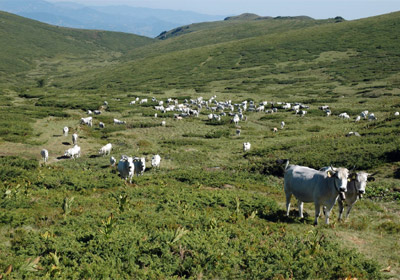Western Stara Planina region, Bulgaria

Western Stara Planina region, Bulgaria
Western Stara Planina region, Bulgaria, is an area with extensive pastures surrounded by forests and patches of small-scale arable land and traditional orchards.
Farming systems rely on extensive grazing by dairy cows and suckling cows, sheep and goats, and grassland mowing.
The key issues faced in the area are privatisation of the common pastures and their abandonment. There is a need to add market value to agricultural products from the area. The area has hosted many grassroots-level activities, such as two Leader-led local groups, active farmer participation in the agri-environment measures, special legal framework for the governance of common/municipal pastures, and active environmental NGOs.
For more information on the HNV farming systems, challenges and innovations, see the innovations page of Western Stara Planina region.
More info: www.efncp.org/projects/hnv-bulgaria-romania/western-stara-plania/
Contact person:
Participatory approach
Since its founding in 2014, the Society for Territorial and Environmental Prosperity (STEP) has been working with different stakeholders in Western Stara Planina (WSP) learning area (LA) in Bulgaria. STEP has implemented several projects for sustainable management and use of HNV grasslands in WSP. Together with its local partners, STEP has formed a partnership group of farmers, local authorities, NGOs, advisors, members of the community, and other existing initiatives. This established a discussion platform where the opinions of different stakeholder’ groups can be shared and explained. STEP is convinced that pragmatic and mutually beneficial solutions can only be achieved with the participation of all members of the community and that finding the key to good decisions requires time and efforts of many different layers of society.
The HNV-Link participatory process in WSP was a natural continuation of the relations and the trust gained between the organisation, its partners, and the local stakeholders. STEP engaged local actors throughout the project implementation through activities of interviews and bilateral stakeholder meetings with public administration, farmers and farmer representatives. STEP’s experience in multi-actor work assured that the concerns, aspirations and perspectives of the actors were given a prominent role in all these events.
The process started by identification of the key stakeholder groups from the HNV farming perspective, and assessment of groups’ motivations, expectations, and potential contributions to the project objectives and activities. The first round of face-to-face meetings in the framework of HNV-Link project was carried out in October 2016, when the project team identified and visited key stakeholders and explained the project objectives and activities. The team used these meetings as an opportunity to increase awareness on the importance of HNV farming for the community as a whole.
STEP’s next action was a questionnaire to survey stakeholders’ expectations. The questionnaire and some additional questions were sent in advance to those stakeholders that had helped in organising the meetings and establishing new contacts in the LA. Further to this, STEP carried out 48 interviews in WSP LA in February 2017. In addition to the questionnaires and interviews, the meetings helped to identify the main challenges faced by HNV farming and the whole LA and outlined how the past explains current development. They provided opportunity to learn from the local initiatives and the good and bad practices. They were also essential to gathering data and HNV farming innovations for WP1 and WP2. STEP experts actively participated in the meetings of the two Local Action Groups in WSP learning area where HNV-Link project was presented and discussed.
The LA innovation workshop gathered 35 representatives of the local and regional agricultural offices, advisory services, municipal authorities, NGOs, farmers’ associations, farmers, food processors, and others. Together, they discussed the long-term vision for the conservation and development of high nature value farming in the learning area, articulated as "agricultural modernization taking into account natural and cultural heritage in the region”, that is a precondition for an integrated socio-economic development and nature conservation of the area.
The WSP LA vision and the project activities were presented at the Godech municipal fest (21.07.2017) and the European Rural Parliament gathering in Vernhorst, the Netherlands (20.10.2017).
The partnership created between STEP and a NGO local stakeholder, “Local initiative for Varshets,” resulted in the new project proposal “HNV farming innovations in Stara planina”. The project was submitted for funding in the framework of Interreg-IPA CBC Bulgaria-Serbia Programme with the project’s Serbian partner, the association “Natura Balkanika”. The main objective of the proposal is to enlarge the HNV-Link network with partners and innovations from the Serbian part of Stara Planina and other HNV innovations from the Bulgarian part of Western Stara Planina. If successful, the project will build on the experience and knowledge of the HNV-Link project and will work for securing the future of HNVf systems in Stara Planina on both sides of the border.
Table 1: List of participatory events
| Activities | Number of participants | Date |
|---|---|---|
| Bilateral meetings with stakeholders | 10 | Oct 2016 |
| Interviews and meetings with local stakeholders | 50 | Feb 2017 |
| LAG meeting in Georgi Damianovo | 20 | Feb 2017 |
| Local workshop on innovations | 40 | June 2017 |
| Godech municipal fest | 40 | Jul 2017 |
| ERP Market of Initiatives | 30 | Oct 2017 |
Gallery
Video
Outputs
-
 Western Stara Planina region, Bulgaria LA
Western Stara Planina region, Bulgaria LA
- Baseline Assessment
- Report from the Innovation seminar (website)
- National Language Report Innovation seminar
- Innovation report
- Participatory approach, Western Stara Planina region, Bulgaria
- Western Stara Planina region, Bulgaria, HNV-Link Final Conference (Poster)
- Action Plan
(April, 2019)The compilations of the respective reports from all project learning areas - Baseline Assessments, Reports from innovation seminars, and Compendium of Innovation - can be found in 'Outputs'. Reports from the Innovation seminars are in the national languages, all other materials are in English.








